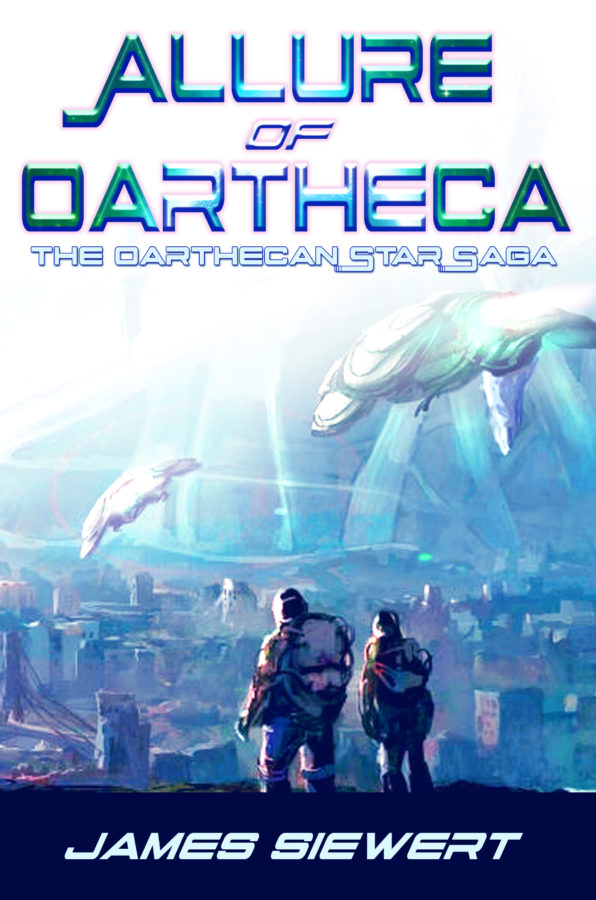Genre: Sci-Fi, Romance
LGBTQ+ Category: Gay
Reviewer: Ulysses, Paranormal Romance Guild
Get It On Amazon
About The Book
A space-heist gone wrong. An unexpected romance. A galactic catastrophe in the making.
In the furthest reaches of space, a cyber-thief with a heart of gold meets a ex-navy captain who refuses to be beaten. Though they’re from opposite ends of the galaxy, fate slams these two men together in desperate bid to stop a race of elitist cannibals from destroying all these men hold dear. But their foe is not the only danger our two heroes face – an Allure that whispers promises of rapture, and destruction. If our heroes give in, they lose, if they give up, they lose … and the fate of the galaxy rests in the balance.
In the spirit of high-space adventure, with a touch of charming romance, Allure of Oartheca is a love song to the science fiction genre, placing two men who love men at the forefront of a battle of their past, their present, and – if they’re brave enough, if they’re bold enough – their future. Come share an adventure full of authentic, one-of-a-kind characters, fantastic new worlds, rich imagination and genuine hope in the face of heart-pounding action.
Join the adventure in Allure of Oartheca, and discover how hatred and war are not the only ways to destruction.
Advisory: this book contains scenes of explicit male/male romance, sex and sexuality, and is recommended only for readers ages 18+.
The Review
This is not the kind of book I’d normally grab for my reading backlog. That’s what made it such fun to read it—new discoveries, new ways of imaging romantic fantasy, and so on. James Siewert took me by the hand and led me into this weirdly gentle (gently weird?) universe, a universe filled with stars and planets and civilizations beyond my own pallid, earth-bound fantasies.
Rowland Hale is a sort of Star-Trek Robin Hood (a medieval Earth legend whose gay variants I know well). He keeps telling us he’s not a good guy—but he doesn’t realize he’s lying. He is clearly a genius, and a rebel, and angry at the stifling bureaucracy of the interplanetary status-quo represented by the CAPS (Coalition of Allied Planetary Systems). The technological stuff that Siewert throws at us is—for me at least—dazzling. Not a little terrifying. But Rowland’s character shines through on every single page.
When the sci-fi you-know-what hits the fan, dragging Rowland into what is a terrifying disaster, we meet two of the species that inhabit this richly-imagined galactic world: the Pryok’tel, and the Oarth. The former embodies everything evil in the universe—but at the same time brilliant and elegant, complex and fully evolved. I confess, I was (probably with the author’s intent) put in mind of the Nazi high command during World War II, obsessed about order, rules, precision, record-keeping. Although an alien race, the Pryok’tel are surely a metaphor for the worst of human nature. We get just hints and references to them at first, but they dominate the second half of the story.
The Oarth—with whom Rowland seems to be at first unfamiliar, possibly because they are such a numerically small species and not part of CAPS—are the opposite side of the metaphorical human coin. Furry, gentle, emotional, obsessed with family and social connection. There is a sly (and not remotely subtle) gay echo here, with links to other threads of romance lore, including the Omegaverse and Shifter stories. But the reader gradually forgets those obvious links to our own popular culture, and begins to see and understand the Oarth as a unique and fascinating race of creatures. In particular, Toar, captain of the spaceship that rescues Rowland, becomes the other central character in Siewert’s narrative.
I will say nothing more about yet another part of the book than these few words: you will never see algae the same way again. Weirdly enough, this critical but small-in-scope thread of the plot brought tears to my eyes.
I have already gotten the sequel to this, Barons of Oartheca, because I enjoyed this so very much. I can’t imagine not knowing what happens next. The book ends with a surprise—but not really a cliffhanger. It’s the kind of tease I like a lot—an open door that demands you walk through it.
Five stars.
The Reviewer
Ulysses Grant Dietz grew up in Syracuse, New York, where his Leave It to Beaver life was enlivened by his fascination with vampires, from Bela Lugosi to Barnabas Collins. He studied French at Yale, and was trained to be a museum curator at the University of Delaware. A curator since 1980, Ulysses has never stopped writing fiction for the sheer pleasure of it. He created the character of Desmond Beckwith in 1988 as his personal response to Anne Rice’s landmark novels. Alyson Books released his first novel, Desmond, in 1998. Vampire in Suburbia, the sequel to Desmond, is his second novel.
Ulysses lives in suburban New Jersey with his husband of over 41 years and their two almost-grown children.
By the way, the name Ulysses was not his parents’ idea of a joke: he is a great-great grandson of Ulysses S. Grant, and his mother was the President’s last living great-grandchild. Every year on April 27 he gives a speech at Grant’s Tomb in New York City.
The Paranormal Romance Guild was established in 2009 by 8 Indie Authors and one Reviewer to be a constant help for authors. You can be a free author member, submitting your work for review OR become a Premium Author Member for a small yearly fee and enjoy many extra services including Free Beta Reads, Author Giveaways and many others. Your reviews are posted on our 3 FB Sites, Amazon, Goodreads, Twitter and Instagram. WE REVIEW ALL GENRES LGBTQ+ welcome.
Check out our website: https://www.paranormalromanceguild.com/


